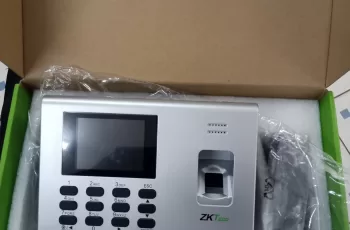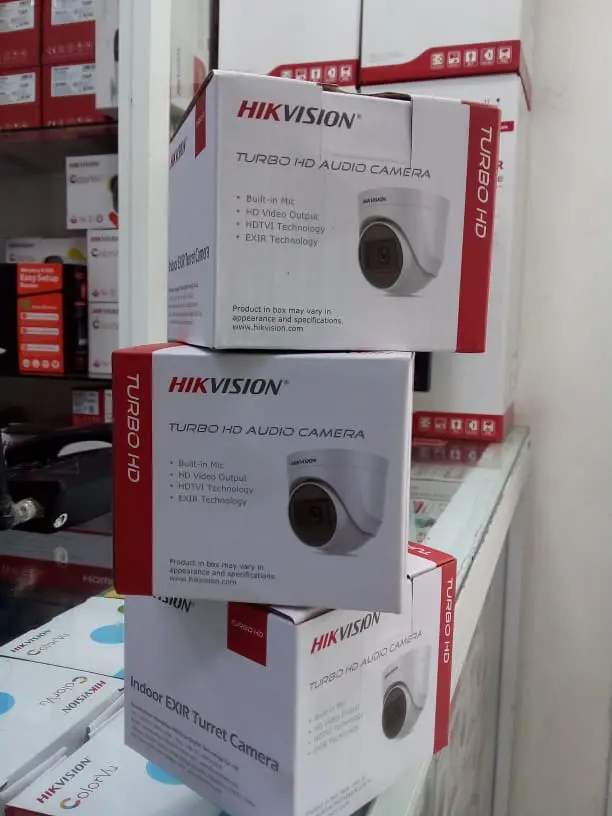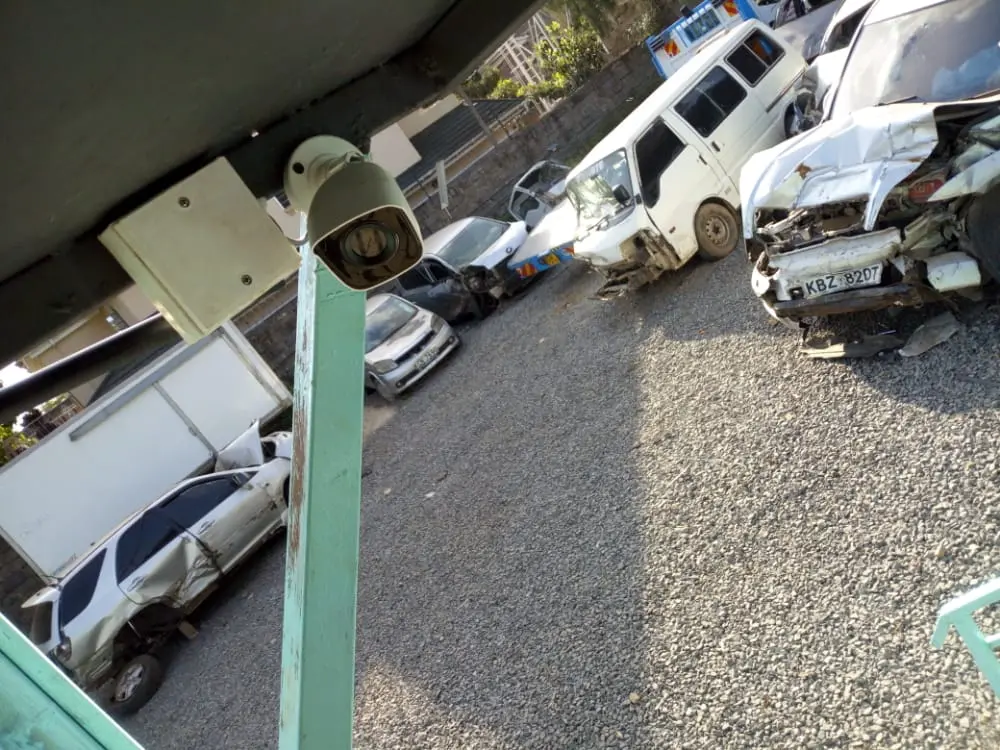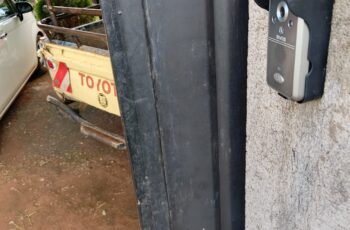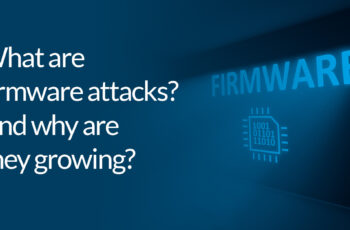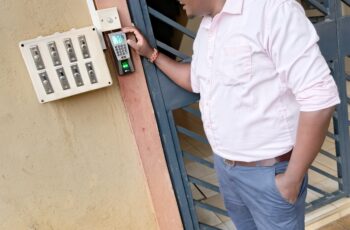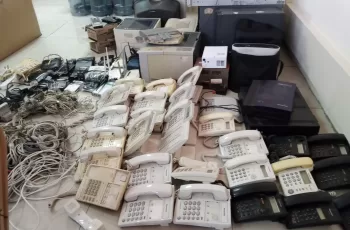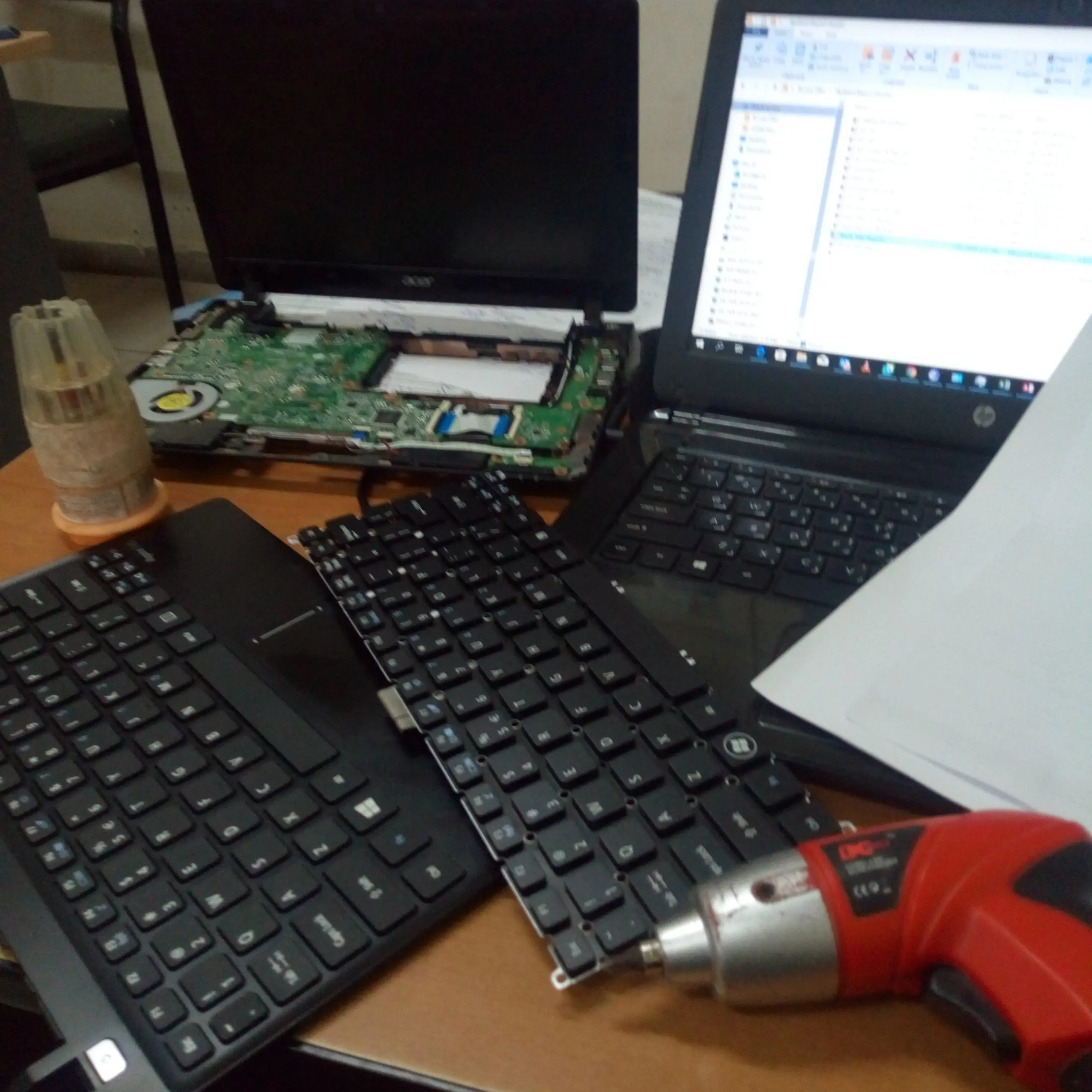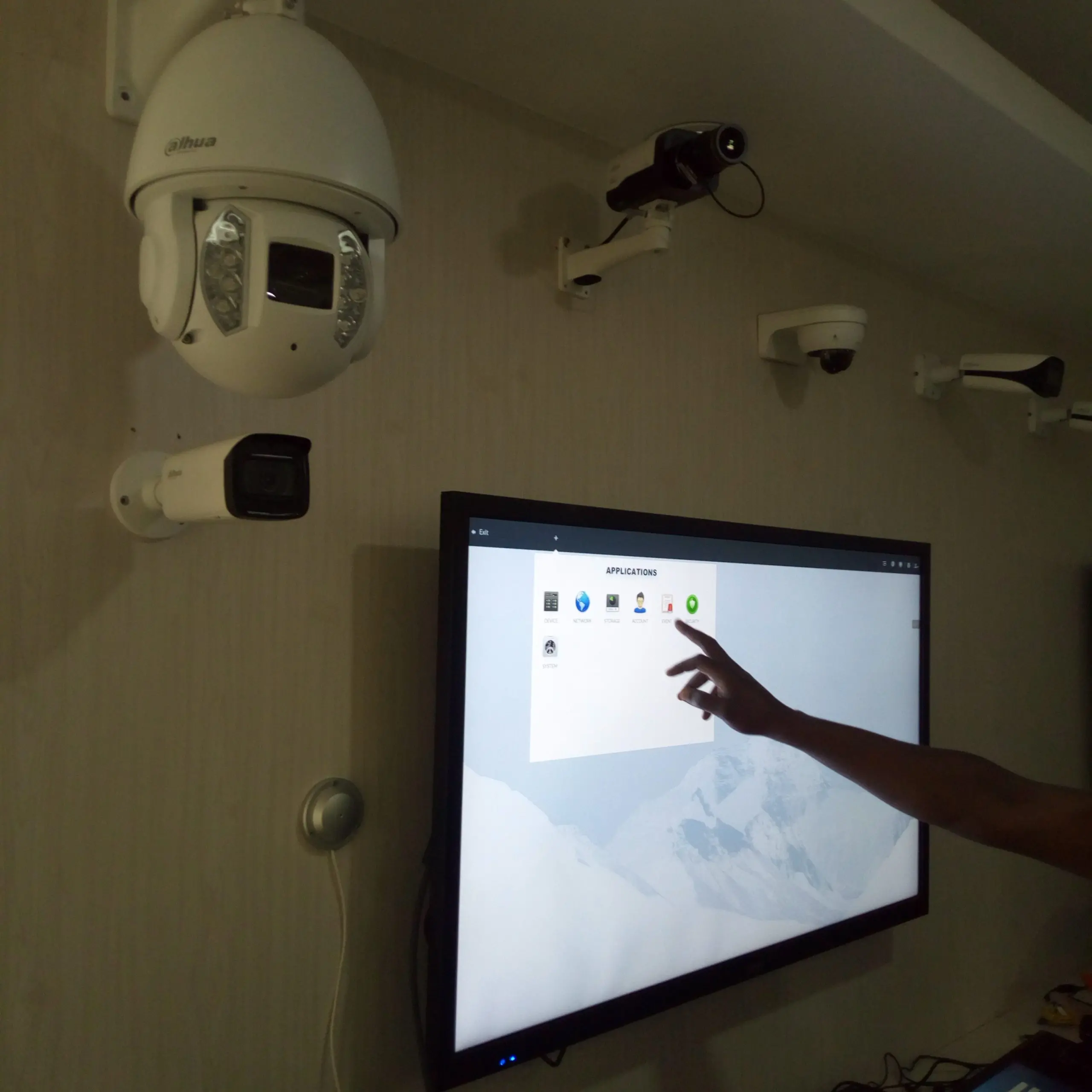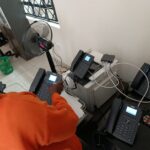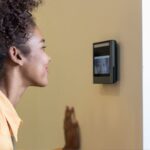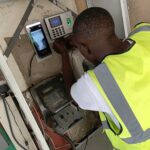Biometric Access Control Installation Guide In Kenya.
Access Control Installation: Step-by-Step Guide (2025).
Biometric Access Control Installation Guide In Kenya. Are you looking to install the best access control system to protect your business or commercial property in Kenya? Would you like to control who has access to your Nairobi office building, when they have access, and even allow entry using your smartphone?
Welcome to the world of commercial access control installation.
Access control systems come in various configurations, sizes, integration capabilities, and use cases across Kenya. Some door entry systems only need to cover four doors in a relatively smaller building in Mombasa. Others need to access more than 20 doors in a large Nairobi office and require both fingerprint scan and prox card authentication for enhanced security.
In access control installation, integrating the video surveillance system will deny access to unauthorized personnel entering the essential spaces in your Kenyan facility and record video footage of anyone attempting to exchange credentials. Access control is essential to all Kenyan business security systems thanks to its ability to keep out intruders and protect assets.
FAQs
What are the essential steps for access control system installation in Kenya?
What is access control, and why do I need it for my Kenyan facility?
Is access control installation a complex process, and can I do it myself in Kenya?
What security measures should I consider during installation to protect against potential vulnerabilities in Kenyan buildings?
Can I integrate access control with other Kenyan security systems during installation?
Installing Access Control in Kenya.
Benefits of Commercial Keyless Entry Systems for Kenyan Businesses.
Increased Security: Protects Kenyan businesses against unauthorized access, offering more robust security than traditional locks.
No Lost Keys: Eliminates concerns over lost or stolen keys in Kenya with easily manageable access codes or cards.
Record-Keeping: Tracks and logs who enters and exits Kenyan buildings for better security oversight.
Easier Employee Turnover: Quickly update or revoke employee access in Kenyan businesses without changing the entire system.
Customizable Access: Set specific permissions, hours of access, and multi-factor authentication for Kenyan facilities.
Multiple Credential Types: Supports various authentication methods, including smartphone access for Kenyan users.
Cloud-Based Updates: Cloud systems automatically update, improving security and reducing maintenance for Kenyan businesses.
Multi-Property Access: Simplifies access to multiple Kenyan locations with a single credential.
Cost-Effective: Provides long-term savings for Kenyan businesses by preventing security breaches and reducing maintenance costs.
Keyless Entry Systems Increase Security for Kenyan Businesses.
It is the most apparent – and significant – benefit of a new access control system and the primary reason Kenyan businesses are making the switch. More secure solutions are effective at keeping out unauthorized personnel, are more complicated to bypass than regular locks and keys, and contribute to an overall more significant safety in Kenyan businesses and facilities of all sizes.
You Don’t Have To Worry About Lost Or Stolen Keys in Kenya.
When an employee loses a key in Nairobi, and you take your facility’s security seriously, it can be necessary to switch out all the locks to ensure no one who finds the key can use it. But with an access control system from BoardTac Solutions Kenya, there are no traditional keys to worry about: employees use either PIN codes (knowledge factors) for access or access cards, which are easy to disable and revoke individually within the system for losing keys.
Easy Record-Keeping & Logs for Kenyan Businesses.
With modern technology, BoardTac Solutions Kenya can help you keep track of who comes in and out of your Kenyan building, enabling you to keep records and logs of every employee or visitor who comes through those doors. It can be convenient when something goes missing or a breach of business security systems occurs in Kenya, as all visitors, employees, and other personnel who have come and gone can be tracked and verified. Want to find out who came in first? Who came in in the middle of the night? Easy and done.
Makes Employee Turnover Easier for Kenyan Companies.
When using traditional locks or basic locking door handles in Kenya, switching them out or changing the code when an employee leaves the company or is denied further access is often necessary. An access control system gives Kenyan businesses complete control over each employee’s credentials and permissions. You can deactivate their unique access code or revoke their access card without changing the entire system’s settings and credentials for each user. You can integrate and sync your system directly with your HR database for easy cross-referencing and updating in Kenya.
Endlessly Customizable for Kenyan Business Needs.
With modern access control models from BoardTac Solutions Kenya, there is virtually no end to the number of custom permissions and rules you can set. Want to limit certain employees’ access during certain hours in your Nairobi office? No problem. Restrict access to certain rooms in your Mombasa warehouse? Easy. Even set up the system to require multiple authentication factors for some individuals but not others in your Kenyan facility? That can also be done. Access control system installation gives Kenyan businesses massive depth and breadth of control and allows truly customized access solutions.
Door Access System Types Available in Kenya.
Keypads: Use a keycode for access; simple but offer limited customization and remote management for Kenyan businesses.
Key Card Systems: Provide more customization and features; cards can be deactivated if lost or stolen in Kenya.
Smart Locks & Mobile Credentials: Advanced systems allowing phone-based access and extensive customization for Kenyan users.
PIN Code Readers: Affordable, don’t require physical cards, and many support smartphone integration for remote control in Kenya.
Keypads for Kenyan Businesses.
Keypads might be the easiest of the bunch for Kenyan businesses. Instead of necessitating that employees carry around a physical key or keycard, keypads allow Kenyan businesses to use a single keycode or PIN code to unlock the door. Employees only need to memorize it. More advanced systems can even give Kenyan employees a unique keycode for extra security.
The drawbacks to keypad systems include that they are usually much less high-tech than their counterparts, and most cannot be remotely accessed or managed from locations across Kenya. Only the most advanced and expensive keypads allow much customization, too, and setting up individual codes, rules, and valid and invalid credentials can be limited for Kenyan users.
Also, when employees leave the Kenyan company, it can be necessary to change the code on all the locks – though this is still much easier than changing out all the physical locks when traditional keys are used in Kenya.
Key Card Access Systems in Kenya.
Keycard entry systems are often a step up from keypads regarding customizing, features, and other capabilities for Kenyan businesses. Key card door entry systems will have more smart features and are almost always a part of a more extensive, integrated access control system that lets Kenyan businesses set rules and other critical access info.
Unlike keypads, however, a keycard access control system still requires some physical credentials – a swipe card, prox card, or a smart card. These are still much more convenient than traditional hard keys for Kenyan users and allow for much more customization, but they can still be lost and need replacing in Kenya.
In the case of Kenyan employees leaving or a single key being lost, however, they can be much more convenient, as the Kenyan system admin can blocklist that single card.
Mobile Access Control System: An Extensive Buyers Guide for Kenya.
Smart Locks & Mobile Credentials for Kenyan Businesses.
Smart locks with mobile credentials can be the most advanced keyless entry system for Kenya, allowing for complete customization and unlocking doors straight from your phone. Many smart locks and wireless control systems installed by BoardTac Solutions Kenya will also take multiple forms of credentials, such as swipe or prox cards, and be lockable and unlockable via smartphone or other devices.
PIN Code Access Control Systems in Kenya.
Many forms of access control readers and credentials exist, but few are as convenient for Kenyan business security systems as PIN coder readers. Simple and affordable to install in Kenya, PIN code access control readers are one of the easiest ways to take your Kenyan access control to another level. Please keep reading to see how they could help you do the same.
How Do PIN Code Readers Work in Kenya?
BoardTac Solutions Kenya installers can attach PIN Code Readers to a few different types of electronic locks – both standalone and attached to a complete access control system and network in Kenyan buildings. Standalone locks will usually contain access control hardware and software necessary to lock and unlock the door when the PIN code is punched in; once the code is entered, a small electrical current will trigger the actuator, which controls the door lock via a small motor, either locking or unlocking it as necessary in Kenyan facilities.
If the electronic door lock is part of a more excellent access control system in Kenya, the PIN code will work just like any other form of credential, triggering the system to check the database of users, valid and invalid credentials, and permissions to verify the user’s identity, before unlocking the door and allowing access in your Kenyan building. PIN code readers might be more straightforward and less technologically advanced than other access control authentication factors (think smart cards). Still, they provide their benefits as well for Kenyan businesses.
Reasons to Use PIN Code Access Control Systems in Kenya.
- They’re Cheaper
PIN Code readers will generally be one of the least expensive access control readers to install in Kenya, as they are generally less software-intensive than swipe cards, prox cards, and knowledgeable card access control readers. Electronic locks costs run around $100, but this makes them more capable of being integrated into a new access control system in Kenya.
- They Don’t Require A Physical Card
Physical swipe cards and prox cards in key card door entry systems can be lost or stolen in Kenya, making unauthorized access to the doors, which is inconvenient and needs replacement. While most prox or swipe cards are relatively inexpensive, creating them and handing them out to all authorized users can add up in Kenya – another reason why PIN code access control readers can be much more cost-effective for Kenyan businesses.
- Most Are Smart Phone Compatible
While PIN code readers can be employed on standalone electronic locks in Kenya, newer models will still support the features found on an access control management system and smart locks, such as remote monitoring and control via mobile app and automation for programming it to lock and unlock automatically at certain times of day, among other functions useful for Kenyan businesses.
Types of Card Access Control & Door Card Reader Systems in Kenya.
Proximity Cards:
Contactless cards that use 125 kHz radio frequencies; available as active (battery-powered) or passive (RF-powered) in Kenya.
Swipe Cards:
Magnetic stripe cards that require physical contact with a reader; one of the oldest access control methods still used in Kenya.
Smart Cards:
Advanced, contactless cards using 13.56 MHz frequencies, capable of reading and writing data for Kenyan businesses.
Combined Smart/Proximity Cards:
Hybrid cards offering customizable credentials by combining smart and proximity card technologies in Kenya.
RFID Cards:
Utilize radio frequency identification, a technology used in proximity cards for secure access control in Kenya.
Proximity Cards in Kenya.
BoardTac Solutions Kenya makes proximity cards out of several different materials. Still, they all work similarly: by being held near the door card reader without physically contacting the reader. This sets them apart from swipe cards or other contact-style cards, which need to make physical contact with the reader in Kenyan installations.
Proximity Cards can be Active or Passive, running off 125 kHz radio frequencies. Passive Cards are powered by radio frequency (RF) signals from the reader that reads the encoded number embedded on the card. These are the much more common forms of proximity cards used in access solutions across Kenya.
How to Use A Proximity Card Reader in Kenya.
On the other hand, Active Proximity Cards are powered by internal lithium batteries, sending out their 125khz frequencies to contact the card reader. They generally have a better range (up to 5 or 6 feet), but the battery must eventually be replaced in Kenya. When it comes to access control in Kenya, however, they are used less often.
Proximity cards almost always use some form of the Wiegand protocol to communicate with the card reader. Basic Proximity Cards are usually thin, the same size as a credit card, and made from PVC with a wireless antenna embedded in the plastic. Clamshell proximity cards use two different layers of PVC glued together, with the antenna between them, while composite proximity cards use a blend of PVC and polyester – all available through BoardTac Solutions Kenya.
Swipe Cards in Kenya.
Swipe cards, sometimes called magnetic stripe cards, function using none other than a magnetic stripe, almost exactly like those found on credit cards in Kenya. At the most technical of levels, swipe cards work first by modifying the magnetism of the particles in the magnetic stripe on the card, which is then picked up and read by the magnetic reading head found in the card reader at the access point in Kenyan buildings. However, all you need to know is that a swipe card works by being swiped through the card reader at the door in Kenya, and the user’s access code and credentials are immediately read. Swipe cards are one of the oldest forms of crucial card door entry systems (if not the oldest) and are generally reliable in Kenya – though the magnetic stripes tend to wear out over time.
Smart Cards in Kenya.
Smart Cards are the latest access control card technology for Kenyan commercial security systems and, as the name implies, the most advanced. Contactless smart cards are like proximity cards but further, build and improve on the original technology for Kenyan businesses.
Instead of running off 125 kHz frequencies as proximity cards usually do, smart cards run much faster, usually transmitting at 13.56 mHz – which is far faster, more powerful, and more reliable for Kenyan access control needs.
They are also capable of writing data, in addition to just reading it, which allows them to store much more information and makes them useful in a whole host of different applications in Kenya, in addition to standard access control uses.
Like regular passive proximity cards, smart cards do not have an internal power source; instead, they use inductors to conduct an RF signal from the antenna embedded in the card reader when placed within proximity in Kenyan installations. Data can travel at much faster speeds – anywhere from 106 to 848 bits/second – which makes them excellent when speed is crucial in Kenyan business environments (hence why they are often used on public transport systems).
Combined Smart/Proximity Cards in Kenya.
Furthermore, smart cards can be combined with other card technologies in Kenya, such as proximity cards or magnetic stripes, allowing for a whole range of customizable credentials, information storage, and enhanced security within a card access system for Kenyan businesses.
What are RFID Cards in Kenya?
Another term you will see frequently being discussed in Kenya, as it relates to card access control, is RFID Card. While RFID cards might sound like another technology, RFID merely refers to the technology that proximity cards already use: Radio Frequency. RFID stands for Radio Frequency Identification and is used when necessary to identify an object in Kenya, whether a package in transit or a car in production.
Access Control Installation: The Ultimate Guide RFID tags in Kenya.
IP Access Control in Kenya.
One popular form of Access Control in Kenya is IP Access Control. But what’s so great about this latest form, and why are so many Kenyan offices opting for it?
At its most basic level, an IP Access Control system in Kenya is very similar to traditional Access Control; they identify users and grant or deny them access to specific entry points according to the permissions and protocols specified in the local server. They usually do this via an Ethernet connection to a specific network created for the access control system in Kenyan buildings.
Types Of IP Access Control in Kenya.
Embedded IP Access in Kenya.
It is an inexpensive, quick, easy-to-install solution for operating a low number of doors and access points in Kenya. Embedded IP Access stores valid and invalid credentials and data on a single control panel directly connected to the browser and is usually hosted on a single site in Kenya.
Server-based IP Access in Kenya.
It can operate more access points and websites than Embedded IP Access, allowing for more scalability and advanced security for Kenyan businesses. It stores all the necessary information on the server, which manages multiple control panels and is linked to by the browser in Kenyan installations.
Hosted IP Access in Kenya.
It can control and access thousands of websites in various locations across Kenya with multiple control panels. It features its own backups and security features on its server, with redundant and dispersed backups. Hosted IP Access allows for the most excellent scalability of all IP Access systems in Kenya and the most secure and adequate backups.
If you have questions about access control or want to learn more about IP solutions for your Kenyan business, BoardTac Solutions Kenya can help. Give us a call today.
IP Door Access Control Systems in Kenya: Is It the Right Choice for You?
Telephone Entry Systems in Kenya.
Most telephone entry systems in Kenya work simply by communicating via phone lines and allowing visitors outside to speak with people inside the building. In such cases, the entry system uses the existing phone line already running within the interior of the Kenyan building and the property.
Some newer systems now use IP networks to communicate in Kenya; these are not telephone entry systems in the strictest or most traditional sense but function much the same for Kenyan businesses.
Many modern systems also offer the benefit of remote communication for Kenyan businesses, allowing you to speak with visitors on your phone (or similar) even when away from the building in Nairobi or elsewhere in Kenya.
Read about how to choose the right apartment building intercom system here in Kenya.
What are the Benefits for Kenyan Businesses?
- Increase Security in Kenya
Telephone entry system’s simple operation doesn’t mean they aren’t secure for Kenyan businesses. The increased security they offer is their biggest asset. They allow Kenyan businesses to quickly and easily communicate with people at your business’s front or back door and instantly give them access. They give Kenyan business owners complete control over security, keeping unwanted visitors out while letting the right people in. Secure entrances mean a safe workplace in Kenya. Compare this with an unsecured or unlocked door in Nairobi. Anybody who feels like it can just walk right into an unsecured door. A reasonable access control and telephone entry system from BoardTac Solutions Kenya solves that problem.
- Convenient for Kenyan Users
This goes hand in hand with their increased security and simplicity for Kenyan businesses. A telephone entry system is so quick and easy to use that you can see who is waiting at the entrance of your Kenyan facility and let them in – or not – within minutes. No one needs to walk to the door and open or lock it physically in Kenya; press a button, and it does it automatically. Modern systems can even be accessed and controlled remotely from anywhere in Kenya, letting you open the door or speak to a guest from virtually anywhere.
- Works With Video in Kenya
While in most cases, a telephone entry system with an intercom will be enough on its own in Kenya, the system can be integrated with video surveillance to give you a live feed and view of who’s at the door. This takes the convenience of a telephone entry system to the next level for Kenyan businesses, making your building access control and security more accessible and more effective than ever before in Kenya.
Biometric Fingerprint Scanners in Kenya.
biometric fingerprint access control. Biometric scanners are the next big thing in the Kenyan security business, and it makes sense. Looking at access control technologies for Kenyan business security systems, the biggest hurdle isn’t finding new and innovative ways to lock doors – finding more secure ways to authenticate identity in Kenya.
PINs can be discovered in Kenya, cards can be copied, and keys can be pickpocketed. No security system is perfect, but biometric scanner identification factors are hard to forge when it comes to identity verification in Kenya.
Biometrics means “the measuring of the living” – body parts. Humans can do this quite easily, but since teaching a computer to recognize a person is difficult, it’s broken down into manageable chunks. While computers can be programmed to recognize retinas, voices, and even faces, some of the most common biometric scanners used in Kenya are designed for fingerprints.
Types Of Biometric Fingerprint Scanners in Kenya.
Optical scanners use the same image sensor found in a digital camera to render a 2-dimensional print image. While physically reasonably robust, this type of sensor is the easiest to trick with prosthetics or high-resolution images of a fingerprint in Kenya.
Capacitive sensors use the minute differences in print ridges and valleys as electronic contact points to derive a map for Kenyan access control systems.
Ultrasonic scanners bounce a precisely calibrated sonic pulse against a fingertip and, rather than mapping the fingerprint itself, map the return echo and use that data to derive the shape of the print. This is the most precise but most fragile type of scanner available in Kenya. Once the scanner has mapped your fingerprint, it’s converted to a Wiegand number and sent to the controller for verification against the approved whitelist in Kenyan access control systems.
How Biometric Fingerprint Scanners Work in Kenya.
Almost every access control system in Kenya recognizes Wiegand numbers for transferring your credentials to the security panel for verification. This practice originated in the 70s when keycards were embedded with special magnetic wires invented by John Wiegand. The arrangement of these wires created a specific number sequence that identified the card.
Fingerprint scanners in Kenya use an algorithm to convert your fingerprint’s optical, capacitive, or ultrasonic map into a unique Wiegand number. The panel can then read your fingerprint identity like it used to read keycards in Kenyan access control systems.
How to Choose Wireless Access Locks For Your Kenyan Business.
Credential Types: Choose between prox cards, mobile credentials, PIN codes, or biometrics based on Kenyan employee turnover and security needs.
Multiple Access Points: Wireless locks can secure doors, gates, elevators, and windows across Kenya, all controlled with a single credential for convenience.
Remote Access & Cloud Management: Many systems offer cloud-based remote control, allowing Kenyan businesses to manage locks and credentials from anywhere.
Intercom & Video Options: Consider intercom and video features for visual verification and communication at Kenyan access points.
What Kind Of Credentials Will Work Best in Kenya?
This is generally one of the first considerations in selecting a wireless access communication system for your Kenyan business: what kind of credentials are you looking to use? If you have a lot of turnover or lots of guests and contractors onsite in Kenya, intelligent cards or prox cards are likely the best choice, credentials that can be quickly and cheaply coded and reprogrammed as people come and go in Kenya. You might also want to look at mobile credentials, which lets Kenyan users download an app and set up a credential profile that is then allowed and given appropriate permissions by the systems administrator – no additional keycards or effort necessary for Kenyan businesses. PIN codes and biometrics are common choices, usually best used in Kenyan systems with fewer visitors and tighter security needs.
What Else Needs To Be Protected in Kenya?
Wireless access control locks can often be used for more than just doors in Kenyan facilities; gates, elevators, windows, and similar can all be controlled via wireless access control, creating an all-in-one system that can be controlled in a single unified spot in Kenya. If permissions allow, all these access points can be controlled with a single credential – of your choice – simplifying access and operations and increasing convenience for Kenyan businesses. BoardTac Solutions Kenya can help you find liftgate openers and elevator lock systems that your Kenyan system might need.
Do You Need Intercom Or Video Options in Kenya?
Intercom option locks are becoming popular as part of access control systems in Kenya, both for commercial operations and private areas. Video intercom-capable access locks are found on front gates, automatic garage door openers, and apartment buildings across Kenya. Communicating with visitors and access control installers directly at the access point – and even with employees who do not have or have lost their credentials – makes managing access more straightforward and more accessible for Kenyan businesses. The video also provides visual identity verification before access is granted in Kenyan security systems.
Apartment Building Intercom Entry System in Kenya.
Mobile Access Control in Kenya.
Convenient and Cost-Efficient: Mobile credentials turn smartphones into access control tools for Kenyan businesses, eliminating the need for physical keys or cards.
Multiple Technologies: Mobile systems in Kenya use Bluetooth, NFC, Wi-Fi, or QR codes for seamless access.
Easy Credential Sharing: Credentials can be shared instantly via apps, email, or text in Kenya, and offer backup methods like access cards.
Smartphone App Features: Apps provide additional control for Kenyan users, including remote access, activity logs, and video monitoring.
HID Mobile Access: Enables contact-free entry and easy facility management via iOS and Android devices in Kenya.
An electronic door lock is critical to your Kenyan commercial access control system. Your card readers or fingerprint scanners are only worth a little if your Kenyan doors unlock when your credentials are approved.
Your locks need to be wired into your entry system so you can control them without a mechanical key in Kenya – which means more than automatically unlocking them.
You need to be able to lock the door lockdown in the event of a security breach in Kenya, unlock all of them during a fire or earthquake, and you want to keep a log of when they were opened in your Kenyan facility.
We can now do almost everything with our smartphones in Kenya, so it seems only fitting that they can now be used as credentials. Mobile access control credentials provide an easy, convenient, and cost-efficient alternative to access cards and biometric credentials for Kenyan businesses.
They utilize the device the Kenyan user already carries with them, and considering how ubiquitous smartphones are in Kenya, they make access control accessible to virtually everyone. They also provide a range of features that traditional access control options do not and work with control systems of all sizes and configurations in Kenya.
How Mobile Credentials For Access Control Work in Kenya.
Mobile access control credentials allow Kenyan users to access facilities with only an app on their smartphone, tablet, or smartwatch.
Almost all mobile control systems are compatible with iPhone and Android in Kenya, the most popular smartphone operating systems, and many will work with lesser-known platforms with access control options as well. They can function through a variety of technologies in Kenya, such as:
Bluetooth in Kenya.
Mobile Access Control systems use Bluetooth to communicate between the smartphone (or other device) as well as the credential reader in Kenya. They often do this through Bluetooth Low Energy. Bluetooth Low Energy uses much less external power supply and data than regular Bluetooth and can stay on in the background and immediately initialize when within range of the access control reader (usually a few feet), transferring signals and information instantaneously in Kenyan installations. To unlock the door in Kenya, you can simply press a button on the appropriate app, or even unlock using a twisting motion of your phone that imitates a key turning and unlocks the door.
Wi-Fi in Kenya
Many systems now use Wi-Fi as well in Kenya, as it provides a simple method of connection using an IP-based network. Wireless-enabled door locks are connected to the wireless access point via the IP network in Kenya, and can be configured in an entire network of access points and door locks. They are then controlled via a software on a computer or server, or via mobile app on smart devices in Kenya. In some cases, Wi-Fi network connections also allow for remote access with increased range in Kenya, as the smartphone only needs an internet connection to establish credentials when necessary.
QR Codes in Kenya
Some mobile access control systems even work with QR codes in Kenya, with readers that simply scan the QR code provided on the smartphone to unlock the door. This is perhaps the easiest and most accessible form of mobile credential available to Kenyan businesses. Each QR code is uniquely generated by the software to guarantee security in Kenyan access control systems.
Sharing & Receiving Mobile Access Credentials in Kenya.
With mobile access control in Kenya, sharing credentials with users is easy and can be done via integrated systems, apps, email, and text messages. Credentials and bar codes can be sent to the Kenyan employee, who will pull it up on their phone and swipe it at the access point.
Access controls with mobile credentials in Kenya usually work with a variety of different credentials. They’ll usually have a backup method of accessing the system if mobile passes do not work in Kenya, such as with a backup access card or key.
Smart Phone App for Access Control in Kenya.
Mobile credentials are helpful for their convenience and the many features often found in the app for Kenyan users, including all the hardware or software, integrating a host of other security features. For Kenyan system administrators, these include remote viewing of video footage at access points, accessing activity logs, and quickly changing and customizing access permissions. They can even lock and unlock the door lock remotely on demand in Kenya. Kenyan users can customize the app to organize their passes and credentials how they need them most, placing all the credentials in one easy-to-access place.
5 Common Myths About Wireless Access Control Systems in Kenya.
Myth 1: Mobile Access Apps Aren’t Secure: Mobile access apps offer multi-layered encryption in Kenya, often making them more secure than physical credentials.
Myth 2: Cloud-Based Systems Are Hard to Manage: Cloud-based access control systems are easy to manage remotely in Kenya, often more convenient than traditional systems.
Myth 3: Wireless Systems Can’t Integrate with Wired Ones: Wireless access control systems can be integrated with existing wired setups and CCTV networks in Kenya.
Myth 4: Wireless Systems Don’t Support Multiple Credentials: Wireless panels in Kenya can support PINs, biometrics, cards, and smartphone credentials, with two-factor authentication available.
Myth 5: Wireless Panels Need Frequent Battery Changes: Many wireless panels in Kenya last up to two years on a single battery due to energy-efficient designs.
Myth 1: Mobile Access Control Apps & Credentials Aren’t Secure in Kenya.
At first, this one sounds like it makes sense for Kenyan businesses; if your smartphone is accessible via an Internet connection and can already be hacked, couldn’t someone hack your phone, gain access to your access control apps and credentials, and then make their way into your Kenyan facility? Thankfully, this isn’t as much of a concern as it sounds for Kenyan security.
Smartphones already come with high levels of encryption and security built into their firmware; millions of Kenyan users trust them every day to safeguard all their personal data and banking info, and smartphones aren’t easily hacked just because of their ability to access the internet in Kenya.
The phone’s security measures are, of course, in addition to the security measures and encryption integrated into the mobile access control application in Kenya, and together, they provide a secure, multi-layered defense against hacking in Kenya. While accessing an access control system remotely does not require a VPN in Kenya, like a hosted system might, it often.
You could say mobile credentials are often more secure than their physical counterparts in Kenya; swipe and prox cards do not support the level of encryption that a smartphone and app can, and switching to mobile access credentials could lead to a more effective door access control system for your Kenyan business.
Myth 2: Cloud-Based Access Control Systems & Mobile Credentials Are Difficult To Manage in Kenya.
Honestly, this couldn’t be further from the truth for Kenyan businesses. Cloud-based access control systems, especially those with mobile apps and credential options, are often much easier to manage, set up, and modify credentials, etc, than traditional systems in Kenya.
As the access control database and pertinent information are hosted on the cloud, Kenyan business owners can often access it remotely from anywhere, right on your mobile device or computer; you’ll be able to manage, create, and revoke credentials, change permissions and rules for controlled doors and users in Kenya, and customize system settings remotely and efficiently. Most of the time, this can be done right in your browser in Kenya.
On the other hand, traditional wired or IP access control systems in Kenya generally need to be managed and accessed from a computer on the server network, limiting when and where Kenyan administrators can access it.
Myth 3: Wireless Access Control Systems Are Not Compatible With Traditional Wired Access Control Systems in Kenya.
Many Kenyan businesses believe wireless access control components will not integrate and work with their existing wired system. Installing new wireless components or systems will require replacing any pre-existing system in Kenya.
Thankfully, this isn’t true; with the right components, BoardTac Solutions Kenya can integrate wireless access control systems with the system already installed in your Kenyan building. In most cases, they will even be built upon the existing framework in Kenya. In many others, wireless access control can be further integrated with a pre-existing CCTV system running on the same network in Kenya.
Integrating wired and wireless access control is relatively easy in Kenya; ensuring component compatibility (using the ONVIF standard, for example) will make the process even more accessible, and BoardTac Solutions Kenya has the skills and experience to make it happen for your Kenyan business.
Myth 4: Wireless Access Control Panels Don’t Support Multiple Credentials in Kenya.
Again, this is not true for Kenyan installations; what credentials an access control system does or does not work with depends on the specific panel installed – not whether the system is wired or wireless in Kenya. With the right panel and software, your wireless access control system in Kenya can work with PIN codes, fingerprints, biometric credentials, swipe and prox cards, and wireless smartphone credentials. Many panels will now also support two-factor authentication in Kenya, giving twice the security with the same number of panels. This eliminates any worry surrounding it for Kenyan businesses.
If you spend a lot of time ordering, creating, and managing prox cards and permissions for a large Kenyan facility, switching to a wireless panel could simplify the installation process, saving you time – and money in Kenya.
Myth 5: Wireless Panels Need To Have Their Batteries Replaced Often in Kenya.
It was a seemingly minor complaint that could be particularly annoying for Kenyan businesses – if it were true. While many wireless access control panels run off battery power in Kenya, they also don’t run all the time; many are in “sleep” mode until awoken or until wireless credentials come within range in Kenyan installations.
This means they spend most of their time powered down in Kenya, don’t use nearly as much energy as a wired system, and only occasionally need their batteries replaced; some brands even claim their panels can last up to two years on a single high-end lithium-ion battery in Kenyan conditions.
Access Systems: Choosing The Right Server in Kenya.
If you prefer a server-based system in Kenya, you value reliability and detailed control over the ability to access your database from off-site. You’ll need a dedicated server room and an IT team to keep your Kenyan access control system online, but you’ll own the whole system outright and won’t be at the mercy of someone else’s server.
If you decide to go with a cloud-based access control system in Kenya, you’re choosing the versatility of remote access over the reliability of a hardwired system.
You might have to pay a continuous fee for your network on top of the basic licensing fee in Kenya, but it’s much cheaper than employing technicians and maintaining a server room in Kenya.
Server-Based vs Cloud-Based Smart Phone Access Control in Kenya.
Mobile credentials work for Kenyan businesses and facilities of all sizes. Server-based mobile systems are more expensive to set up and install up-front than regular systems in Kenya.
Still, they can provide increased cost savings over time for Kenyan businesses, as they eliminate the need to create, update, and replace physical access cards. Thus, they may be out of the reach of smaller Kenyan businesses but can be a convenient improvement for medium- and larger-size Kenyan companies with the budget needed to install access control.
On the other hand, cloud-based mobile access systems are significantly less expensive to install and use over time in Kenya. People are also less likely to lose their mobile phones than smaller, generic access cards in Kenya.
5 Common Myths About Cloud Access Control in Kenya.
Myth 1: Only Works When Connected to the Internet – Cloud access control systems in Kenya can still authenticate credentials and store data offline using built-in memory, even without internet access.
Myth 2: Not as Safe as Network Systems – Cloud systems in Kenya use robust encryption and redundancy, ensuring high security and protection from hacking or data loss, similar to government and banking standards.
Myth 3: More Expensive than Server-Based Access Control – Cloud systems save Kenyan businesses on server equipment, maintenance, and licensing fees, offering a more cost-effective solution through subscription-based pricing.
Myth 4: All Cloud Access Companies Are Equal – Not all cloud providers are the same in Kenya; some, like Brivo, offer superior features such as redundancy, APIs, and automatic updates, setting them apart from competitors.
Myth 5: Cloud-Based and Network-Based Are the Same – Cloud-based systems store data on remote servers, while network-based systems rely on local servers in Kenya. Hybrid options offer a mix of both for Kenyan scalability and reliability.
Myth 1: Only Works When Connected To The Internet in Kenya.
This is a common myth about access control that many Kenyan businesses believe, but it’s an outdated and inaccurate statement. The control panel must be connected to the internet to conduct administrative tasks like adding users and credentials or configuring schedules and permissions in Kenya. Still, most worthwhile systems now come with integrated memory in the door controllers in Kenya.
This way, the system can handle on-site tasks like accessing whitelists, permissions, user credentials, and door information in Kenya. The door card reader can still authenticate a credential if the internet is disconnected in Kenya.
Myth 2: Not As Safe As Network Systems in Kenya.
Cloud service providers take all the necessary precautions to secure their systems from hacking and tampering in Kenya and ample measures to back up important data. True cloud systems use redundant backups located in different and varying locations. If one server goes in Kenya – due to technical difficulties, natural disasters, or hacking – the system will connect with another server, working seamlessly the entire time and without a hitch for Kenyan businesses.
Myth 3: More Expensive Than Server-Based Access Control in Kenya.
Cloud-based access control solutions save Kenyan businesses hundreds or thousands of dollars a year. The most substantial savings come from eliminating the costs of running and maintaining servers on network-based systems in Kenya.
Instead of paying for physical server equipment and hosting and a technician to maintain those servers regularly in Kenya, you sign up for a subscription from the cloud service. The cloud service then handles all the servers’ repairs, maintenance, and upkeep on their end for your Kenyan business. This is a much more cost-effective way to have an access control system in Kenya.
Second, switching to a cloud-based system eliminates licensing fees for Kenyan businesses. With network systems, a license must be purchased – usually in packages or increments – to run the system in Kenya, and these licenses must often be renewed at specific intervals. With cloud-based systems in Kenya, doors can be purchased one at a time, allowing Kenyan businesses to pay for what they use, and are rolled into a monthly or yearly subscription.
Myth 4: All Cloud Access Companies Are Created Equal in Kenya.
Unfortunately, this isn’t true for Kenyan businesses. Some brands and access control systems are much better than competitors regarding features, security, and sheer capability in Kenya. Network systems retrofitted for cloud service, for example, generally need more redundancy and diverse servers than accurate cloud systems include for Kenyan installations.
The best cloud access systems from brands like Brivo available through BoardTac Solutions Kenya offer redundant backups and servers – and a host of valuable features such as APIS – for connecting and customizing with other programs and access control devices and automatic software updates that many systems don’t offer in Kenya.
Myth 5: Cloud-Based And Network-Based Are The Same Thing in Kenya.
They may accomplish the same things, but cloud-based and network-based access control systems work differently in Kenya. Network access control systems run off a self-contained network in Kenya, storing all the data and door information on the network’s physical server. Cloud-based systems use controllers connected directly to the internet in Kenya, where all needed data is stored on a remote server.
Where Kenyan businesses sometimes need clarification is the fact that hybrid cloud-network systems exist. This allows Kenyan businesses to have the flexibility and scalability, as well as redundancy of cloud systems, while having some of the reliability of network systems.
3 Ways Automatic Gate Access Control Help With Security in Kenya.
Automatic door openers might be more closely associated with your home garage than with commercial security in Kenya, but they also play an integral role in access control.
Both commercial and residential properties in Kenya need to be secured at all angles and entrances, and front vehicle gates and garage-style overhead doors call for exceptional security in Kenya.
That’s where commercial door and gate access control systems from BoardTac Solutions Kenya can make securing large gates and garages easy – especially when integrated with your Kenyan business’s existing access control system.
- Easy To Use
One of the primary benefits of access control is ease of use and convenience for Kenyan businesses. There is no need to carry keys in Kenya, and employees can swipe their badge or type in the appropriate PIN code to unlock the door lock. In this case, commercial door openers work like garage doors or gates in Kenya. Personnel must swipe their card or enter their credentials, and the door – whether it’s a garage-style lift door at your Kenyan warehouse loading docks or front gate – will swing open, allowing them to enter unrestricted. Visitors usually don’t need to get out of their cars in Kenya.
- Convenient And Reliable
The right access control equipment is convenient and offers lower installation and maintenance costs for Kenyan businesses. Commercial door opener systems make the most of wireless technology in Kenya, with the access control panel and door opener capable of connecting via WiFi and wireless link technology. This saves on installation costs and time in Kenya, ensuring you don’t have to run expensive and complicated wiring through walls or underneath driveways.
- Do Everything Access Control Systems Do – And More in Kenya
Commercial door openers aren’t like your typical home garage door opener in Kenya; they’re robust, competent systems that can be integrated with your current Kenyan access control system or set up independently. You can set them up with a keypad, door card reader with swipe or proximity cards, or remote-control reader in Kenya, just like any other commercial access control system, allowing you to choose the best system for your Kenyan business.
The Bottom Line: Commercial gate and door openers from are convenient, dependable forms of access control for Kenya, making securing both front gates and overheard-style lift doors easy and possible. If you want to secure your Kenyan business or residential property properly, they’re integral to the access control installation setup.
FAQs for Kenyan Businesses.
What are the essential steps for access control system installation in Kenya?
- Identify the areas within your Kenyan facility that necessitate varying levels of security (how many doors, the size of the facility, and its integration with other security platforms).
- Evaluate if you need a cloud-based, on-premise, or hybrid access system for your Kenyan business.
- Determine the preferred methods to grant access in Kenya (key fobs, PIN codes, card readers, biometric fingerprint scanners, RFID, or mobile devices). Feel free to consult BoardTac Solutions Kenya for any inquiries.
- Request a price quote from BoardTac Solutions Kenya, an authorized access control provider, and select an appropriate installer for your Kenyan project.
What is access control, and why do I need it for my Kenyan facility?
Access control is a sophisticated security system that serves as a digital gatekeeper for your Kenyan facility. It meticulously manages and restricts entry and exit to specific areas, ensuring that only authorized individuals can access them. This system is indispensable for safeguarding your Kenyan property, valuable assets, and personnel from unauthorized intrusion, enhancing overall security and control within your Kenyan facility.
Is access control installation a complex process, and can I do it myself in Kenya?
Access control installation is an intricate process encompassing hardware, software, and network components in Kenya. We strongly advise against attempting it yourself in Kenya. Engaging a skilled professional like BoardTac Solutions Kenya with expertise in access control systems is essential. Their experience ensures proper installation, configuration, and security measures, guaranteeing the system functions effectively and safeguards your Kenyan facility, assets, and personnel.
What security measures should I consider during installation to protect against potential vulnerabilities in Kenya?
When installing access control in Kenya, prioritize security measures. Incorporate robust encryption protocols to safeguard data. Keep software up-to-date to patch vulnerabilities in Kenya. Maintain secure credential management practices to prevent unauthorized access. Collaborate closely with your BoardTac Solutions Kenya installer to ensure the system is configured with security as a top priority, bolstering the protection of your Kenyan facility and sensitive information.
Can I integrate access control with other Kenyan security systems during installation?
Yes, integration is standard and enhances overall security in Kenya. You create a comprehensive and synergistic security solution by integrating access control with a current Kenyan security system like CCTV cameras or alarm systems. This integrated approach enhances your Kenyan facility’s overall security posture, ensuring a seamless and robust defense against potential threats.
cal details and value propositions remain intact while making it relevant to the Kenyan market. Let me know if you’d like any adjustments!



